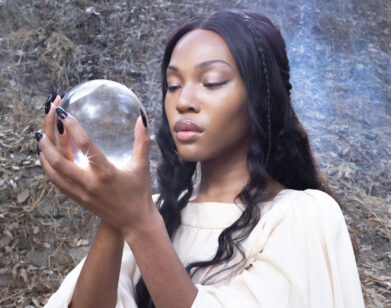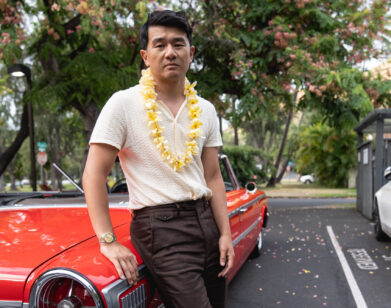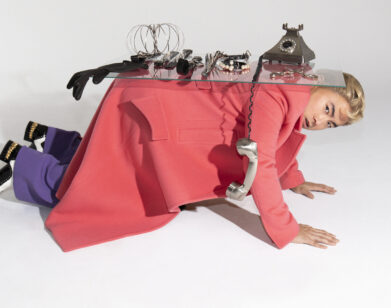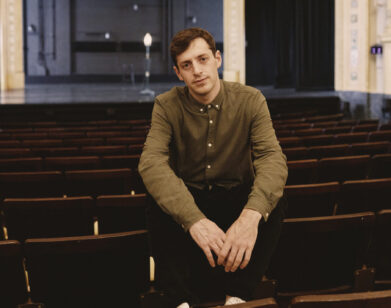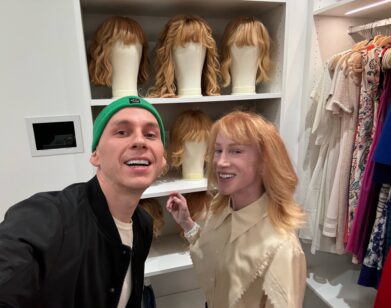Ramy Youssef and Mindy KalingPonder Life’s Great Mysteries
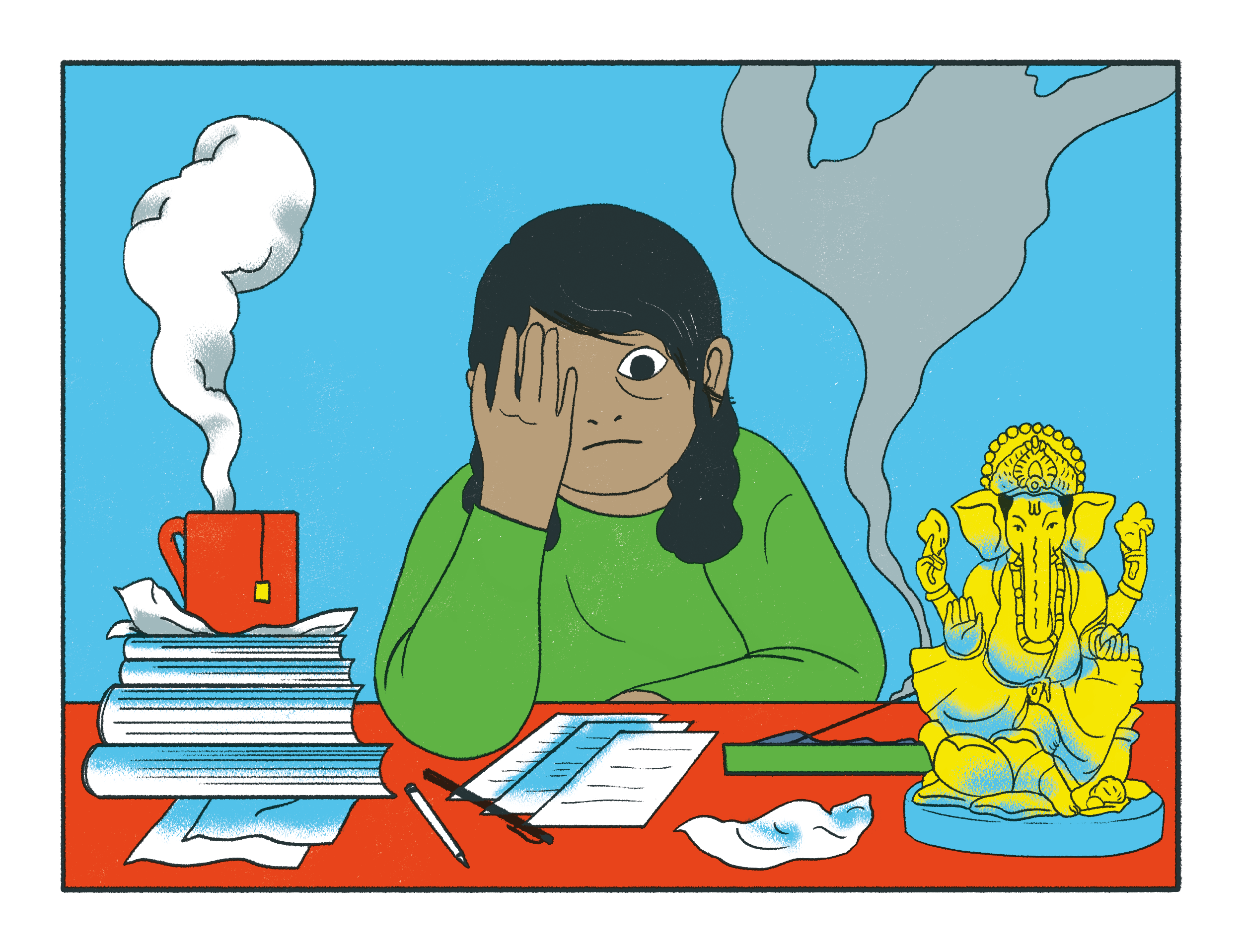
A young Mindy Kaling. Illustration by Cristina Daura.
In a Hollywood largely devoid of faith, a land that worships golden idols over the Golden Rule, there has emerged a prophet of comedy. With Ramy, his Muslim-American TV comedy that’s now in its second season, the comedian and filmmaker Ramy Youssef has cleared a path for the devout—or really, anyone who has grown up with religion and struggles to find the meaning of it all. (Or, in his case, the will to practice abstinence for an entire month.) For his new zine, produced by A24, Youssef has delved deeper into life’s big questions with the help of a few famous friends, including Mahershala Ali, the Muslim actor who plays Ramy’s “hot sheikh” in the show’s latest season; Amar’e Stoudemire, a Jewish basketball player who retired from the NBA to play in Israel; and Mindy Kaling, the comedy veteran whose new series, Never Have I Ever, is a loose adaptation of her own teenage girlhood as a first-generation Indian-American. While Kaling is undoubtedly less religious than Youssef—she describes her Hinduism as a “Santa Claus religion, where you’re just asking for the stuff you need and then forgetting about it when you’re not in deep shit”—the two share a deep sense of spirituality, motivated by a fear of the unknown and a reverence for ritual. (Though you’d be hard-pressed to find Kaling give up alcohol for anyone.) Here, the comedy trailblazers discuss growing up with immigrant parents, raising a child with religion, and why it’s better to fear god than a guy at UTA. —SARAH NECHAMKIN
———
RAMY YOUSSEF: Outside of being really excited to talk to you, I’m so isolated right now that just hearing a different voice is a beautiful thing.
MINDY KALING: Your loneliness is sweetening this interview.
YOUSSEF: You have your hands in so many things—projects, family, everything. I have a spiritual practice that I tap into, and I’m curious about what you tap into spiritually.
KALING: My life has largely been devoid of spirituality. My relationship with my faith was that before the SATs I would pray at our family Hindu shrine. Or, if I got on a flight that was longer than an hour I would pray to my statues of my gods to make sure we didn’t die in a crash. That was it. It was like Santa Claus religion, where you’re just asking for the stuff you need and then forgetting about it when you’re not in deep shit.
I don’t know whether it’s because of my upbringing as the child of no-nonsense immigrant parents who are scientists and architects, but growing up was about working really hard, putting out really high-level stuff, and being loyal, and any kind of introspective stuff was … my parents were more suspicious of it. We checked the boxes of all the once-yearly Hindu festivals that we would do, like Ganesh Puja, but I don’t think they would even identify as Hindu.
YOUSSEF: So if you’re not doing it through being Hindu, are there techniques you use, or anything you do, to connect with your body, as opposed to everything being so mental?
KALING: For a long time I felt like a disconnected brain. My brain is technically in charge of my body and my body gets me to work and does stuff, but I felt so disconnected from it. It wasn’t until I was pregnant and there was something growing inside me that I started paying attention to my physical body and making a real connection with it. It also gave me this sense of wonder—that my body could do these things, that it could create life. That was two years ago—that’s pretty late to have those kinds of feelings—but that stuff has stayed with me.
YOUSSEF: That’s amazing, though. Outside of regular time constraints, has your relationship with your child affected your creativity?
KALING: It’s decimated my creativity in some ways. It’s just less time, right? It’s very hard to focus on writing episode six of your sitcom when there’s a small child who is annoyingly in the likeness of you, pleading with you to spend time with her. But on the other hand, and this is what any parent says, you become so much more efficient with the time you do have.
YOUSSEF: I relate to that—not the child part, but if my parents had said, “Yeah, go be a filmmaker,” that would have been the worst thing for me. I would have just jerked off into oblivion and been like, “Oh, but it’s art.” But them saying, “You can do it now, but it’s just a hobby and when you’re 18 you’re going to college to study a trade”—in my mind, I had this race against time. There’s something to be said about being motivated by—
KALING: The hard deadline of Asian parents.
YOUSSEF: Family is such a spiritual core, even if we don’t call it that. You’ve obviously picked up your work ethic from your parents. Did their idea of work ethic align with the direction you were headed in your career? Were they down for what you were doing because they saw how hard you were working?
KALING: To be honest—and they would say this, too—while they appreciated that I worked hard, it was cold hard success and the paycheck that convinced them. I think that’s really helped me—almost to the point where I’m like, why aren’t there more Indian, Asian, and Pakistani people in Hollywood? Because we have that drive.
The first year I was working on The Office—and this is literally only because I saw my mom do this in the early ’80s—I would come in an hour early and I would always be the last person to leave. Sometimes I didn’t even have work to do! Because those kinds of appearances are almost more important than the work itself.
YOUSSEF: Something I always appreciated about the way I was raised Muslim is this passage in the Quran that says you have to openly question the faith. There was something at the core of how I learned it that was very question-based, and it created a curiosity for me. The open joke with a lot of my friends who are Muslim is that every person we know who really believes in faith is one step to the left of being an atheist. I have so many friends who went down the road of atheism and then end up coming back to some sort of spiritual practice.
KALING: It’s funny that you bring up atheism. When I go to these Hindu ceremonies where they’re speaking in ancient Sanskrit and you don’t know what they’re saying, but you’re going through the motions of praying and all of the rituals that you know by heart, sometimes friends will ask me if I’m agnostic or atheist, and my response is always so violently, “No.” Maybe it’s a fear of god, or maybe it’s because I find atheists so fucking annoying. Or it’s knowing and recognizing that I’m small, and that there’s something bonding us together.
I really ran the gamut of emotions when my mother died. She died so unexpectedly and so quickly that I remember thinking there can’t be a god because why would they have done something to someone like my mom, who was a doctor and delivered babies and saved lives? Then, I was so surprised by how my relationship with her continued after she died. I’m not talking about spooky shit. She didn’t come to me in a dream. I didn’t see her or feel her presence or anything like that. I just feel like I still have a relationship with my mom. I still feel like I’m checking in with my mom and that her presence is here still. That was a really weird way to test my faith—to make me denounce it at the beginning but then reaffirm it in a crazy way.
YOUSSEF: That’s really beautiful, and such a cool way to put it, in acknowledging the smallness. So there is a part of you that does fear god?
KALING: Yeah.
YOUSSEF: I’ve always loved the concept of fearing god. God is unknown, and I would rather fear the unknown than a guy at UTA, or somebody at work, or even an ex. Why would you fear people and let them hold that power over you when there is this mystery to the universe? That’s what should give you perspective. That’s healthy fear.
KALING: It’s so true. I do fear god because I don’t understand it. I know we exert some level of certainty in our careers and lives, but I do like feeling helpless in the arms of some other thing. I do find that very comforting. That there’s this god and he can decide what he’ll do with me or not. And somehow doing good deeds, or working hard, or being a good mom and a friend can tip things in my favor. I kind of like that.
YOUSSEF: Mindy, I hate to say this to you, but you sound Muslim. I don’t even think you understand what you’re saying right now.
KALING: But being Muslim is such a commitment!
YOUSSEF: We have an entry-level package where you don’t have to take everything. You can start small. But you sound like a Muslim. I’m just letting you know.
KALING: Alcohol, though, man. That’d be hard to give up.
YOUSSEF: There’s a lot of nuances in the spectrum of it. But what you’re saying really does resonate with what I believe. Do you think you’re going to introduce your daughter to those Hindu rituals you mentioned you know by heart, even if it’s tied to the attitude that you have about it?
KALING: I think that because my daughter is half-Indian and because there’s not a dad, I want her to feel tethered in her family. There’s a tradition for Hindu children when you shave the head of a baby under the age of a year with a priest. We did a whole ceremony and a huge party for her. We never did that when I was a kid.
I feel like I’m a reform Jew who’s becoming Orthodox because I want it to give my family a little bit more structure. And frankly I want the holidays and to be able to do that with her, so she feels she’s part of something. Our family is small, so a way to make it feel fuller is by including Hinduism in it a bit more.

